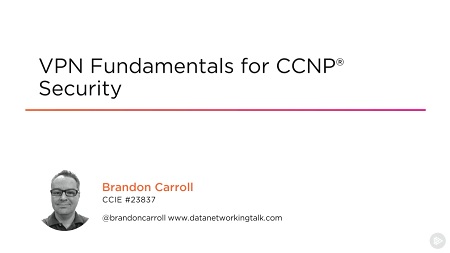
English | MP4 | AVC 1280×720 | AAC 44KHz 2ch | 1h 52m | 164 MB
VPNs are used every day in today’s secure data networks. This course, VPN Fundamentals for CCNP® Security, will teach you the fundamentals of VPN protocols and algorithms while covering topics of the CCNP® Security SIMOS exam.
At the core of VPN connectivity, there are several protocols and algorithms to choose. In this course, VPN Fundamentals for CCNP® Security, you will learn these protocols and algorithms so that you can select the appropriate level of confidentiality, integrity, and origin authentication. First, you will discover the critical threats to data in transit, including masquerading attacks, spoofing attacks, and man-in-the-middle attacks. Second, you will learn about the benefits of a VPN, VPN components, and VPN options. Next, you will explore confidentiality, integrity, and origin authentication. Finally, you will cover PKI concepts involved in a VPN, as well as some general guidelines for deploying a VPN. By the end of this course, you will be able to explain the fundamental features and protocols involved in a VPN.
Table of Contents
01 – Course Overview
02 – Course Introduction and Key Threats to Transit Data
03 – Topology Review
04 – Eavesdropping and Masquerading Attacks
05 – Man-in-the-middle Attacks
06 – Module Summary
07 – VPN Benefits
08 – VPN Types
09 – VPN Types Topology Example
10 – Components of a VPN and Integrity
11 – Integrity Algorithms and Key Management
12 – Non-repudiation
13 – Application and Protocol Support
14 – Crypto Algorithms and Encryption
15 – Symmetric and Asymmetric Algorithms
16 – Providing Data Integrity
17 – Digital Signatures
18 – Non-repudiation
19 – Introduction to PKI
20 – Certificate Authorities
21 – Next-generation Encryption and General Guidelines
Resolve the captcha to access the links!